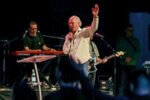While the extraordinary weekend retreat is memorable, it is usually the ordinary moments—filled with seemingly insignificant decisions, conversations and touches—that matter the most. This is where most of life is lived.
The richest things in life are made up of more than Kodak moments. Join me as we look briefly at four reasons to embrace your ordinary life now:
1. Because being faithful is more important than being relevant. Every generation fancies itself the most important one to come along, that they’re going to change the world—until the vitality of youth succumbs to nursing homes and the annals of dated trends. Movements are short-term, organized campaigns led largely by youthful zeal, opposed to institutions with regular procedures for maturing and acquiring the sorts of knowledge and skills to be a competent member of the community.
In other words, ironically, calls to “revolution” or “radical discipleship” actually undercut the long-term and sustainable community at large and specifically the discipleship to which the New Testament calls us. We’re too busy and distracted by the “need of the moment,” to pragmatic concerns of relevance, to actually submit to someone and something larger than ourselves.
Nobody seems to chronicle the burnouts, including leaders of these frenetic movements, much less their enthusiastic followers. On the left, people imagine (even in the church) that they’re “prophetic” when, in retrospect, they were simply jumping on the bandwagon of something that the rest of the culture had already figured out. On the right, the church imagines that they are “reaching the lost” when, even statistically, they’re losing the reached.
Simple faithfulness, which may take years of practice, is more important than immediate results that bear no fruit over time. While some things are seen immediately, other fruit takes time to bear results of either good or evil in the lives of people. Relevance may seem to bear the fruit of acceptance before others and God, but in the end those who go unseen in their deeds of faith will receive the commendation of the Father.
2. Because being a real hero means embracing people instead of causes. The most important contributions in history have been made by people who were doing what they believed they were called to do every day rather than by those who set out to be “stars.”
I know, none of this is very American. Most people reading this will think what I’m saying is, “Hey, be mediocre!” It’s not. It’s a call to be at our posts, doing what God has gifted us to do, for the good of actual people—not “The Poor,” “America,” “The World,” or “History,” but simply to be who we are where God has placed us in service to the people around us. This is very difficult—it’s a lot easier to be committed to causes than to people, to movements than to ordinary churches, schools, callings and neighbors.
We must come to realize that being a hero means going unseen and unsung, learning to embrace people over our own schemes and plans for glory. The true heroes, the ones we actually need, often go on day by day, cleaning the bathrooms at school, fixing our lunches at home. These thankless and unseen jobs are where the real battles lie, which can become the basis for ordinary success from day to day. Through such simple faithfulness, God delights in serving us through people’s ordinary callings.
3. Because God meets us in the everyday, not in the “movement.” The cult of the extraordinary is impatient with the ordinary ways in which God works. There’s a tendency in such circles to assume that God only works in the big stuff: earthquakes, healings, and other headlines. But God has always preferred the weak things. God becomes a human being in a feeding trough for livestock.
God is so accommodating to us, in a descent of love, that we miss Him in all of our attempts to climb ladders of experiential exuberance and newsworthy activism. No, God isn’t remote—He just doesn’t look like what we assume. We see God enthroned on a cross, where His kingdom meets the kingdoms of this age. He did it for us. It’s not our movements, but His grand movement toward us—all of us—that makes the difference in history. Through such ordinary things like water, bread and wine, normal sinners are incorporated into the life of God, His redemption, and renewed to live and love in their callings.
4. Because being faithful doesn’t have to look spectacular for it to matter. What does this mean for our lives now? For the parents of a child with a terminal disease? For the parent who finds it hard to get out of bed because of a debilitating depression? For the children who suffered sexual abuse for years without any aid?
For ordinary people who still hold out some hope that when they do go to church for something strange, disorienting and accessible—God in the flesh, Immanuel (God with us)—God does extraordinary things through ordinary means.
That’s the message throughout the Bible. God descends to us; we don’t rise up to Him. While we’re searching for God in all of the high places, He actually comes to us in the low places, where we’d least expect Him. That changes everything. Instead of trying to make God a supporting actor in our life movie, we need to submit to the “indignity” of being written by Him into His unfolding drama. It’s a big story. And it makes the ordinary extraordinary indeed.
To recover the ordinary is the pressing need of our day if we are going to create a sustainable life for us and our posterity. It is not the values of the market that should pervade our strategy sessions and fill our hearts with concern, but the eternal value of being in Christ. Maybe, just maybe, if we discover the opportunities of the ordinary, a fondness for the familiar, and marvel again at the mundane, we will be radical after all and find a God who is near us.
Michael Horton is the author of more than 30 books, including his latest, Ordinary. He is a professor at Westminster Seminary in California. He also hosts the White Horse Inn broadcast/podcast and is editor of Modern Reformation magazine.







Leave a Comment
You must be logged in to post a comment.